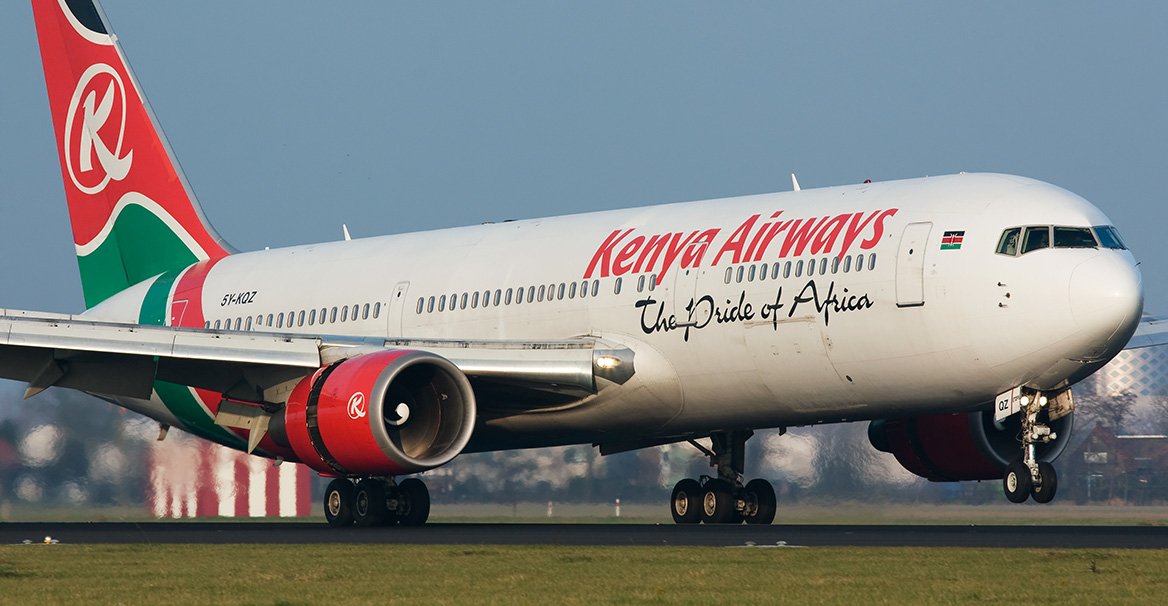Kenya Airways is contesting a government deal allowing Ethiopian Airlines to operate passenger planes grounded by the coronavirus for shipment of cargo from the Jomo Kenyatta International Airport (JKIA) in Nairobi to Europe and Asia, Business Daily reports.
The loss-making KQ has said the new deal will give the rival carrier undue advantage in a period when Kenya has frozen international passenger travel in the wake of the coronavirus outbreak, leaving cargo as the only revenue driver.
On April 6, the Ministry of Transport allowed Ethiopian Airlines to vary its licence for passenger planes and use six aircraft to ferry cargo from Nairobi and Mombasa to overseas at a time when carriers are charging a premium for the service.
Kenya Airways is worried that Ethiopian Airlines will take a huge chunk of the business of shipping flowers, fresh fruits, vegetables like green beans and peas as well as meat that have become increasingly scarce in Europe as the coronavirus pandemic hampers the global movement of produce.
KQ chief executive officer Allan Kilavuka said the carrier was not consulted on the impact that the Ethiopian Airlines deal would have on its business.
The national carrier is banking on the cargo business, which generates about KSh11 billion annually, to pay salaries and utilities like security, water and electricity.
“We have objected the move to have Ethiopian Airlines use their passenger flights for cargo business in Kenya because we were not consulted on the impact that this would have on our business,” said Mr Kilavuka in a phone interview with the Business Daily.
Mr Kilavuka was of the view that Kenya Airways should have been consulted before varying Ethiopian Airlines licences, arguing that JKIA is the hub of the national carrier.
“Anytime you have a carrier wanting to come to your domain, you need to be consulted so that you are not disadvantaged at your main market,” he said.
The State suspended all cross-border passenger flights on March 22, stopping KQ’s foreign flights. The order effectively cut off Kenya Airways’ flow of new revenues at a time when it had no cash reserves.
Last Monday, the government also barred movement into and out of four counties including Nairobi, Mombasa, Kwale and Kilifi, forcing Kenya Airways to ground flights and hinge its survival solely on cargo business.
So far, the loss-making Kenya Airways has sought a multibillion-shilling government bailout after the grounding of its planes.
Without State aid, the airline risks running out of money in the near future against the back- ground of banks’ uneasiness in lending to Africa carriers.
KQ has now warned that the Ethiopian Airlines deal will worsen its cash flow.
Kenya on April 6 allowed the profitable Ethiopian Airlines to modify six passenger planes for shipment of cargo from Nairobi and Mombasa.
“Reference is made to your letter… this is to advise you that approval is granted to Ethiopian Airlines to operate as cargo flights from April 3 to October 25,” says a letter signed by Director of Air Services, Nicholas Bodo, and seen by the Business Daily.
The carrier has already received permission from the aviation regulator, the Kenya Civil Aviation Authority (KCAA), to start operating the cargo service. Most cargo airlines have pulled out of the Nairobi route following the outbreak of coronavirus across the world.
The withdrawal has created a gap for cargo transport despite high volumes of freight needed for the European market where Kenya sells over 80 percent of horticulture produce.
Ethiopian Airlines has maintained restricted passenger services. The planes flying cargo from JKIA are charging more, encouraging the likes of Ethiopia Airlines to seek a larger piece of the market.
Operators have tripled the price per kilo of produce to $3 in the two weeks to end of March, according Hosea Machuki, head of the Fresh Produce Exporters Association of Kenya, which represents 117 growers and exporters.
While governments from Kenya to South Africa are struggling to turn around loss-making State-owned airlines through restructuring or by bringing on board private partners, Ethiopian Airlines has bucked the trend.
It posted operating revenue of $3.9 billion (KSh395 billion) in its 2018/19 financial year, up from $3.3 billion (KSh334 billion) a year earlier. Its net profit also rose to $260 million (KSh26.3 billion) from $207.2 million (KSh21 billion) from its 143 destinations where it carried 12.14 million passengers.
In contrast, Kenya Airways reported revenue of KSh114.45 billion for the year to December 2018, up from Sh106.17 billion a year earlier. It narrowed its pretax loss to KSh7.59 billion from Sh9.44 billion in a year it carried 4.84 million passengers in 54 destinations.
KQ’s problems have been linked to a mix of increased competition, corruption, mismanagement and a previous debt binge that continues to weigh heavily on its balance sheet.





